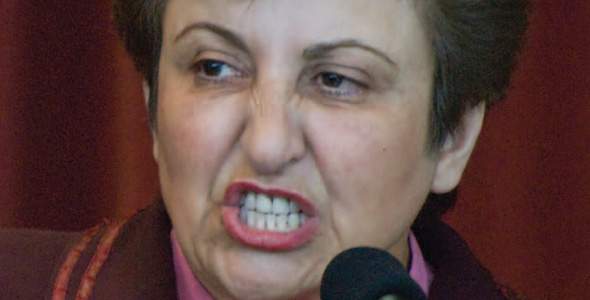Nobel Peace Prize winner Shirin Ebadi spoke to a packed auditorium at the San Francisco Jewish Community Center on May 18, touching on Iran’s feminist movement, the country’s upcoming June elections, and the need for peace between Iran and the United States.
The question-and-answer discussion with Ebadi, an Iranian lawyer and human rights advocate, was moderated by Janet Benshoof, president and founder of the Global Justice Center in San Francisco.
The first Iranian woman to preside over a legislative court, Ebadi addressed the present and future of Iranian-American relations, bringing a striking thoughtfulness to controversial topics.
“I believe in every country we have to begin with the commonality of our principles, rather than the differences,” said Ebadi, speaking through a translator. While acknowledging that Iran has far to go in ensuring equal rights for women — at one point observing that a woman in Iran is legally worth only half as much as a man — she urged Americans to learn more about Iran.
“I believe that here and in the world many people have a narrow, wrong impression of Iran,” said Ebadi. “Show Iran exactly as it is — no darker and no lighter than it truly is.”
Ebadi was among Iran’s first crop of female judges, struck from her post when a spate of anti-feminist laws enacted after the 1979 Islamic revolution barred women from judicial positions. Reduced to clerking in the court she once ran, Ebadi chose early resignation, and through articles and lectures soon became a role model for Iran’s fledgling Islamic feminist movement.
Ebadi’s precise diction and dry wit, which won her both laughter and appreciation from the audience, are the product of a fierce intelligence: her law degree, obtained in 1965, was the first granted by Tehran University to a woman.
In the years since her demotion, Ebadi has founded three nonprofit organizations to protect the rights of Iranian women and children. Ebadi’s Association for Human Rights Advocates has provided pro bono legal help, by her estimate, to 65 percent of Iran’s political prisoners – including recently released U.S.-Iranian journalist Roxana Saberi.
Ebadi, 62, made headlines in January, when she was threatened in her Tehran home by a mob, which shouted slogans against her and vandalized her home. In December, Iranian authorities shut down Ebadi’s Center for the Defense of Human Rights, and confiscated her computer and tax records.
Though censored, suppressed, and jailed, Ebadi has continued to speak out. Her latest initiative is the Million Signatures Campaign, a petition seeking to repeal laws discriminating against women. She has also pushed for Iran and the U.S. to join the International Criminal Court, to try human rights cases, and an International Convention, to eradicate global poverty. In addition to campaigning on behalf of Iranian women, Ebadi has written five books: four dissertations on various aspects of Iran’s legal system, and a memoir, Iran Awakening, which was recently issued in paperback (Random House: $14.95).
As Ebadi made her comments, laughter and applause spread across the audience even before the interpreter made her understood to English-speaking listeners.; among the 252 ticketholders were many Iranian-Americans. Ebadi views these expatriates as a means to spread peace and understanding.
“There are two million of you living in this country,” she observed in response to a Farsi-speaking questioner, “and if each has five relatives or friends still living in Iran, imagine how many people on both sides want peace.”


